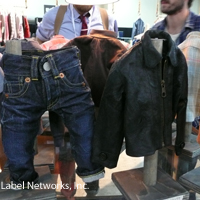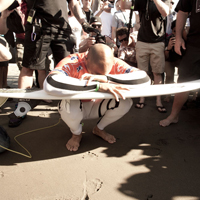Melting Google image by street artist Zevs via Wooster Collective
Yesterday, April 6, the Associated Press (AP) stated that they’re over Google making money from their content, and all the others out there from the primarily so-called secondary media such as bloggers whom they believe are stealing their content. This comes at a time when newspapers lost more than $7.5 billion in the last year in the U.S. alone and are closing shop faster than you can say “stop the presses.”
The AP declared that they will start policing the web for unauthorized usage of their stories -mainly headlines. You see, points of entry to news have changed, especially for a new generation that’s grown up online. Points of entry may be news portals or a Google search, RSS feed or Twitter, but once you’ve read the headlines, often times you’re not going to click through to the originator of the content. So aggregators of content, such as Google, make money from ads sold on their sites from the headlines, which AP believes is unfair. And the old game of advertising via traffic becomes a non-reality because it’s only a fraction of people getting something out of your information. Thus you’ll have more haters of formats like Twitter if Twitter ends up tacking on tiny ads for each Tweet.
It’s important to understand why the AP is so pissed. The AP is an organization that is actually made up of newspapers who subscribe to their original content. Back in the day, it made sense to get your news, especially international, from the AP, and then round-out the rest of your editorial from local reports. But as newspapers dry up, so have subscribers to AP content, thus putting AP in jeopardy, (which also brings up the question of how relevant will the AP be in the future). So instead of blaming the newspapers (or their old business model), the AP is blaming aggregators, some of which are bloggers, but they are mostly going after the king-pin of aggregation, Google. Google’s saying wait a second, here. The editor of the Wall Street Journal, Robert Thomson is saying bloggers are “nothing more than parasites,” and Rupert Murdoch, owner of the WSJ (and other publications), is saying “Google should not be allowed to steal copyrights.”
It should also be noted that the internet over the last 10 years has made not only AP news widely available -but other types as well. The AP, and other mainstream media organizations no longer have a monopoly on such news. Through technology and the internet, citizen journalists abound across the world; CNN started an iReport video section just to keep up, and now many local news stations and mainstream media outlets are getting a percentage of their content (and loads of ideas) from citizen journalists, including bloggers.
However not all bloggers are good guys, with many stealing more blatantly than mainstream media outlets and never linking back to the source of their story, but then again many do. The question is, if someone re-writes a story based on a mix of stories, and personal ideas (like a DJ mash-up) is this copyright infringement? Did street artist Shepard Fairey violate AP copyright law with his Obama poster re-mastered from an AP image? When does “original” content start and when does it stop?
The same thing is going on in the music industry and has for some time. Now, with radio. The Recording Association of America, spearheaded by Billy Coragan from the Smashing Pumpkins is lobbying Congress to pass a bill that states that radio stations need to pay for the artists that they play. Many do, but many don’t. Artists are saying that it’s not fair that their songs are played while radio stations are making money from ads. Artists are loosing revenue because radio is selling ads and not paying the artists. In this case, artists want to be paid every time a song is getting used and are lobbying Congress to create a law which will likely result in micro payments or syndication rights for artists from radio stations.
For the AP, they’ll need to write encryption code and crosstrack content through searches (like a digital watermark) by seeking patterns in letter combinations. These can then trace back to IP address and then they can pursue through either demanding payment or sending a cease and desist letter. This will take time and money, but YouTube had a similar situation happen to them.
Aggregator sites, especially those who fashion their entire business model on this premise, and some bloggers could be trouble in the near future if the AP policing goes through. Posting news headlines -even with a link to the original source -is still copyright infringement if it’s not being paid for. You may be driving traffic to the source, but you don’t own the copyright with a link, especially if the link is now the “news.”
Bloggers, for their part, also want to make money on their stories, which creates another rub if they believe they are creating original content from other content which again brings back the question of what is original content. Even newspaper reporters admit to getting ideas from other newspapers and sources, and many even have their own personal blogs and are trying to ratchet up their own searches via Google.
It’s a bloody war. In the end, those with original original content and a loyal fanbase will win -and not by making money mostly through ads any longer (therefore, changing the premise that more traffic is mandatory), but likely through a number of things including micro payments from interested readers and syndication rights payments from those needing the original content to maintain their business.
For more information about Youth Culture Digital Lifestyles, New Media, and Communication, email info@labelnetworks.com; (323) 630-4000 about our Digital Lifestyle Profile Reports.


